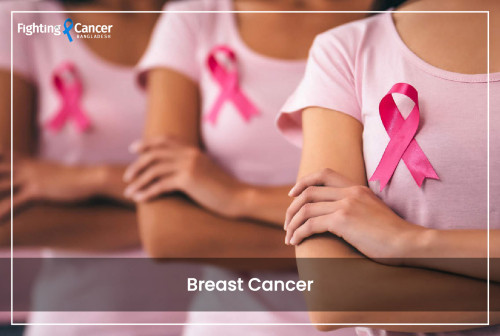
An abnormal cell grows in the breast, forms tumors, and causes breast cancer. Breast cancer begins inside the milk duct or the milk-producing lobules of the breast. 80% of breast cancers are invasive; this can spread to different parts of the body, like lymph nodes or other organs of the body. The invasive breast cancer is life-threatening.
Statistics
You will be surprised to know that breast cancer is the second-leading cancer in women. Worldwide, women of 50s or more are commonly diagnosed with breast cancer, and the percentage is almost 66%.
In Bangladesh, women of 15-44 years old are at the highest risk of developing breast cancer, and the percentage is almost 19.3%. This percentage is increasing day by day, which is alarming.
Risk Factors and Symptoms
Every risk factor does not cause breast cancer. But if you have any risk factors, it is important to consult with a physician, as this may decrease the chances of being affected.
- Age
- Gender
- Menstruation
- Race
- Obesity
- Genetic mutations
- Consumption of alcohol
- Previous history of non-cancerous breast diseases
- Dense breast
- Previous history of having breast cancer
- Breastfeeding
- Late pregnancy
- Infertility
- Receiving treatment like radiation therapy
- Hormone therapy after menopause
- Use of birth contraceptives
The symptoms of breast cancer may vary from woman to woman. In most cases, women are not aware of these symptoms. If you observe any of these below-mentioned symptoms in your breast, you should immediately consult a doctor. The symptoms include an upturn, itching, or sores in the nipple; a sudden change in the size, shape, temperature, and appearance of the breast; the presence of a new lump in the breast or armpit that does not go away; tissue thickening of the breast; changes of the skin over and around the breast; scaly patches around the nipple or breast skin; redness in the breast; swelling; irritation; pain in the nipple or breast; very often it gives a prickly sensation and discharge from the nipple other than milk-like blood.
Prevention
You may not be able to prevent breast cancer, but practicing healthy habits and reducing risk factors can decrease the possibility of being affected.
- Physical activity
- Less consumption of alcohol
- Breastfeeding
- Healthy weight
- Say 'No' to birth control, especially after your 35s
- Limiting postmenopausal hormone therapy
- Healthy diet
- Cessation of smoking
- Intake of medicines
- Screening
Treatment
Treatment of breast cancer depends on the type of cancer and how much it has spread inside or outside of the breast. Doctors may use single or combined treatment. The treatment includes:
- Surgery (removal of the breast tumor)
- Radiation therapy (reduces the recurrence of breast cancer)
- Chemotherapy (chemo drugs used to shrink or kill the cancer cells)
- Hormonal therapy (blocking cancer cells from receiving hormones to grow)
- Biological therapy (improves the body's immunity to fight against cancer)

